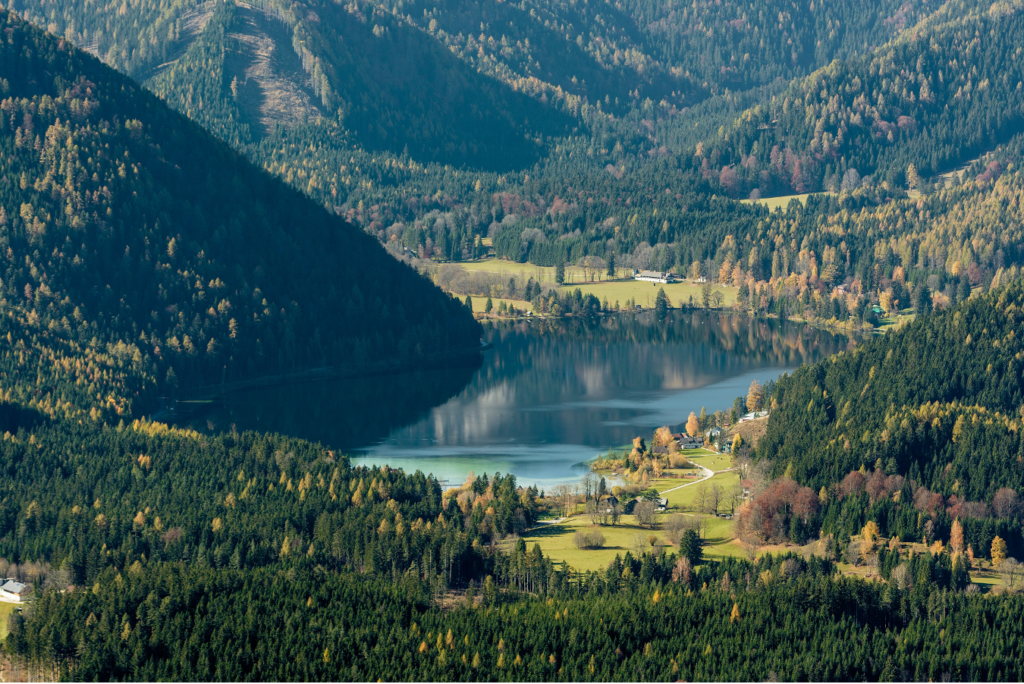Lake Erlaf (Erflauf)
(Poet's title: Erlafsee)
Set by Schubert:
D 586
Schubert did not set the lines in italics[September 1817]
Mir ist so wohl, so weh
Am stillen Erlafsee.
Heilig Schweigen
In Fichtenzweigen,
Regungslos
Der blaue Schoß,
Nur der Wolken Schatten fliehn
Überm dunklen Spiegel hin.
Feenbild, was willst du mir,
So umschwebst du mich auch hier?
Weiche aus dem Land der Hirten.
Hier gedeihen keine Myrten;
Schilfgras nur und Tannenwucht
Kränzen diese stille Bucht.
Frische Winde
Kräuseln linde
Das Gewässer;
Und der Sonne
Güldne Krone
Flimmert blässer.
Ach, weine nicht, du süßes Bild!
Der Wellendrang ist bald gestillt,
Und glatter See, und Lüfte lau,
Erheitern dich, du Wunderfrau.
Des Sees Rand
Umschlingt ein Band,
Aus lichtem Grün gewunden:
Es ist der Fluss,
der treiben muss
Die Sägemühlen unten.
Unwillig krümmt er sich am Steg
Von seiner schönen Mutter weg,
Und fließt zu fernen Gründen.
Wirst, Liebe! auch mit holder Hand,
Des Sängers ernstes Felsenland,
Mit Blütenrot umwinden?
I feel so well, such pain,
By quiet Lake Erlaf.
Sacred silence
In the branches of the spruce trees.
Without movement
The blue womb;
Only the shadows of the clouds are flying
Away across the dark mirror.
You spritely apparition, what do you want with me,
Are you going to haunt me even here?
Withdraw from the land of the shepherds.
No myrtles flourish here;
Only reeds and mighty fir trees
Garland this quiet bay.
Fresh winds
Are gently ruffling
The waters;
And the sun’s
Golden crown
Is shimmering more faintly.
Oh, do not cry, sweet apparition!
The urge of the waves will soon calm down,
And the smooth lake and warm breezes
Will cheer you up, you amazing woman.
The lake edge is
Encircled by a ribbon
Woven from light green:
It is the river
That must drive
The saw mills down there.
It reluctantly winds back on itself by the footbridge
Leaving its beautiful mother behind,
And flows off towards the distant lowlands.
Will you, beloved, also reach out your beautiful hand
And adorn this singer’s solemn rocky landscape,
Surrounding it with blossoming red?
All translations into English that appear on this website, unless otherwise stated, are by Malcolm Wren. You are free to use them on condition that you acknowledge Malcolm Wren as the translator and schubertsong.uk as the source. Unless otherwise stated, the comments and essays that appear after the texts and translations are by Malcolm Wren and are © Copyright.
☙
Themes and images in this text:
Blue By water – beaches and general Clouds Crowns Fleeing Lakes Gold Lap, womb (Schoß) Mirrors and reflections Noise and silence Not moving Shade and shadows Spruce trees The sun Surface of the water Wind

https://commons.wikimedia.org/wiki/File:Erlaufsee_8414.jpg
What is now called Lake Erlauf still looks like a ‘blue womb’ from the surrounding hills. The local communities of Mariazell and Mitterbach are keen to attract visitors, and although their websites make proud reference to Schubert’s song they are understandably less interested in the pain that is as important as the pleasure in Mayrhofer’s text.
Schubert paved the way in this distortion of the poet’s intentions by omitting all the references to the ghostly apparition that seems to have disturbed Mayrhofer by the lake. However, enough remains to suggest that the situation is not totally calm and peaceful. The clouds whose shadows can be seen in the mirror that is the lake’s surface are not simply gliding, they are fleeing from something. Then a new danger arises: fresh winds start to ruffle the surface of the water. Something in the air takes some of the brightness from the sunshine. Where there had been silence and stillness, movement and noise begin to enter the scene.
Mariazell: https://www.mariazell.at/sommer/der-erlaufsee/
Mitterbach: http://www.mitterbach.at/erlaufsee/
Recent photographs: https://www.erlaufsee.eu/index.php/impressionen
☙
Original Spelling Der Erlafsee Mir ist so wohl, so weh Am stillen Erlafsee. Heilig Schweigen In Fichtenzweigen. Regungslos Der blaue Schooß; Nur der Wolken Schatten flieh'n Überm dunklen Spiegel hin. Feenbild, was willst du mir, So umschwebst du mich auch hier? Weiche aus dem Land der Hirten. Hier gedeihen keine Myrthen; Schilfgras nur und Tannenwucht Kränzen diese stille Bucht. Frische Winde Kräuseln linde Das Gewässer; Und der Sonne Güldne Krone Flimmert blässer. Ach, weine nicht, du süßes Bild! Der Wellendrang ist bald gestillt, Und glatter See, und Lüfte lau, Erheitern dich, du Wunderfrau. Des Sees Rand Umschlingt ein Band, Aus lichtem Grün gewunden: Es ist der Fluß, der treiben muß Die Sägemühlen unten. Unwillig krümmt er sich am Steg Von seiner schönen Mutter weg, Und fließt zu fernen Gründen. Wirst, Liebe! auch mit holder Hand, Des Sängers ernstes Felsenland, Mit Blüthenroth umwinden?
Confirmed by Peter Rastl with Gedichte von Johann Mayrhofer. Wien. Bey Friedrich Volke. 1824, pages 94-95; and with Mahlerisches Taschenbuch für Freunde interessanter Gegenden Natur- und Kunst Merkwürdigkeiten der Österreichischen Monarchie. Sechster Jahrgang. Wien, 1818. Im Verlage bey Anton Doll, pages 185-186.
To see an early edition of the text, go to page 94 [108 von 212] here: http://digital.onb.ac.at/OnbViewer/viewer.faces?doc=ABO_%2BZ177450902


